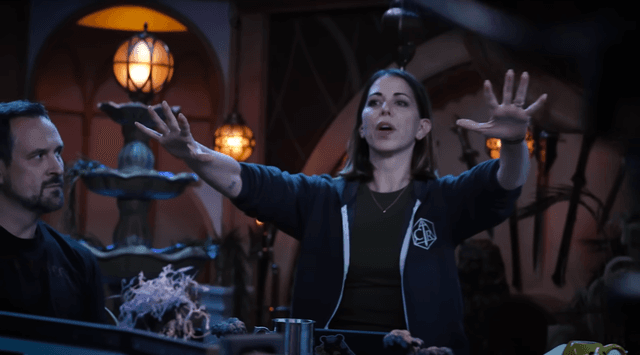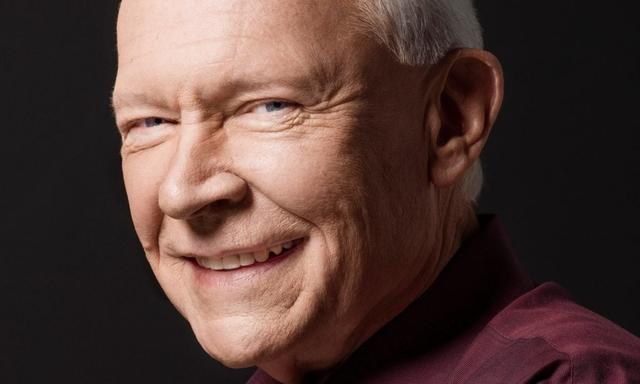If you click on a link and make a purchase we may receive a small commission. Read our editorial policy.
Alison Bechdel's influence on comics & pop culture, explained
The last 40 years of Alison Bechdel's career have altered not just the fabric of comics, but of media and pop culture as well.

Popverse's top stories
- "And my axe!" Lord of the Rings star John Rhys Davies says there's one world leader who deserves Gimli's iconic weapon
- Wonder Man is the Andor of Marvel Studios’ modern TV series on Disney+
- Absolute Batman happened because DC Comics writer Scott Snyder got bored reading about ‘superhero fatigue’
Cartoonist Alison Bechdel is easily one of the most recognized names in comics — especially because her work has transcended the medium to affect all aspects of pop culture. Her seminal graphic memoir Fun Home has been adapted into a five-time Tony Award-winning Broadway musical and her strip comic, Dykes to Watch Out For, is still named as a paradigm example of the medium. There’s also ‘The Bechdel-Wallace Test,’ which for some time was used as the metric by which a work was judged pro- or anti-feminist.
In 2014, Bechdel received a MacArthur Fellowship and in 2019, she was inducted into the Harvey Awards Hall of Fame alongside Hellboy creator Mike Mignola. Her most recent book, a graphic memoir about her lifelong obsession with fitness and exercise titled The Secret to Superhuman Strength, received rave reviews upon its release in 2021 and was named Best Graphic Book of the year by Publishers Weekly.
Let’s break down Alison Bechdel’s influence on comics and pop culture over the years.
Dykes to Watch Out For & ‘The Bechdel-Wallace Test’

Dykes to Watch Out For (DTWOF) was a weekly comic strip that ran from 1983 to 2008 in the American humor newspaper Funny Times. It was also syndicated across multiple gay and lesbian newspapers and posted online. Following in the footsteps of queer comics pioneers like Mary Wings, Roberta Gregory, Larry Fuller, and Howard Cruse, Bechdel presented an early, ongoing look at lesbians through a fictional lens in Dykes to Watch Out For, which followed a large ensemble cast of characters as they moved through their daily lives.
In the introduction to Essential Dykes to Watch Out For (a 2020 collection published by Mariner Books), Bechdel talks about how the work was an introduction to lesbian culture for many readers, and for some it even defined the experience of being a lesbian.
In a 2021 interview with the queer culture site Autostraddle, Bechdel spoke to her seeming dismay around this aspect of the work: “Now that there’s been such a huge blossoming of lesbian culture and there’s so much more stuff out there, I don’t feel that so much anymore. But it was always interesting to me when I would hear from younger women who said, ‘Oh, the first lesbians I ever met were your cartoon characters.’ Suddenly I start thinking if they had been good role models or bad role models.”
Whether or not the characters in DTWOF are good role models, Bechdel’s storytelling and cartooning style for the strip have clearly influenced a number of contemporary creators, from Archie Bongiovanni (Grease Bats, Mimosa) to Ren Strapp (Reine), both of whom have had regular strips published on Autostraddle.
Plus, ‘The Bechdel-Wallace Test’ originates in Dykes to Watch Out For. First appearing in the 1985 strip ‘The Rule,’ two women resembling the future characters Mo and Ginger talk about seeing a movie, but ultimately decide to just go home together when none of the films at the local theater fit their requirements. These requirements, as put forth by one of the women, are threefold: The movie has to have at least two women in it, who talk to each other, about something other than a man. The strip comments on how alienated queer women were in film and entertainment in the ‘80s, and it’s still relevant today.
‘The Bechdel-Wallace Test’ is also called ‘The Bechdel Test,’ ‘Bechdel’s Law,’ the ‘Bechdel Rule,’ and sometimes the ‘Mo Movie Measure,’ in reference to the character herself. In a 2013 blog post, Bechdel said she “stole the idea” of the test from her friend Liz Wallace, and noted that she thought Wallace may have “stole it herself from Virginia Woolf. Who wrote about it in 1926.”
Although ‘The Bechdel-Wallace Test’ was published in ‘The Rule’ in 1985 (and Woolf’s A Room of One’s Own was published 59 years earlier), it took off in the early aughts as a way to measure whether or not a film was pro- or anti-feminist, as well as a way to point out the lack of well-rounded women characters in Hollywood. The test is only somewhat effective in this application, because it was purposefully created to address the alienation of queer women, not all women. Still, its sudden popularity made Bechdel’s impact on pop culture even more prevalent.
Fun Home
Also in the early aughts, Bechdel’s graphic memoir Fun Home: A Family Tragicomic was published by Houghton Mifflin. The 2006 book chronicles her childhood, adolescence, and early adulthood living in rural Pennsylvania with her dysfunctional family, including a particular focus on her complicated relationship with her father. Fun Home is both a coming-of-age and coming-out narrative, and it received immediate accolades.
In addition to spending two weeks on the New York Times’ bestseller list, it also won the 2007 GLAAD Media Award for Outstanding Comic Book, the Stonewall Book Award for nonfiction, the Lambda Literary Award for Lesbian Memoir and Biography, and the Publishing Triangle-Judy Grahn Nonfiction Award. It was nominated for three 2007 Eisner Awards and took home the prize for Best Reality-Based Work, and it’s been on multiple best-of lists for its publication year, decade, and century.
As recently as 2022, Fun Home has been removed from school libraries or otherwise banned in conservative campaigns to remove queer literature from shelves. However, the story’s influence lives on, particularly through the development of a stage musical adaptation, which was first created at a 2009 Ojai Playwrights Conference by Lisa Kron (book) and Jeanine Tesori (music). Fun Home debuted Off-Broadway in 2013 and was a finalist for the 2014 Pulitzer Prize for Drama, in addition to winning the Lucille Lortel Award for Outstanding Musical, the New York Drama Critics’ Circle Award for Best Musical, and the Obie Award for Musical Theater.
Fun Home debuted on Broadway in April 2015 and took home five Tony Awards that year, including Best Musical. Its total run time included 26 previews and 582 regular performances before it went on tour in October 2016. Despite these successes and an impressive stage run, the musical received criticism because its marketing campaign did not clarify the queer narrative.
In 2020, actor Jake Gyllenhaal reportedly secured the rights to adapt the Fun Home stage musical into a film in which he will play Bechdel’s father, Bruce, whose death by suicide and closeted sexuality are examined in her memoir. If and when the film moves forward, it will revisit Fun Home yet again, continuing to further its reach and Bechdel’s, whose cartooning has been so influential for the last four decades.
Bechdel today
Bechdel continues to be an influential force in comics and the queer community. Bechdel was named as a finalist for the Angoulême International Comic Art Festival’s Grand Prix 2023 career achievement award, she also features in the 'No Straight Lines' episode of the ongoing PBS investigative documentary series Independent Lens. 'No Straight Lines' examines the rise of queer comics and features Bechdel, Jennifer Camper, Howard Cruse, Rupert Kinnard, and Mary Wings.
The graphic memoir Fun Home and Bechdel’s other works are also being taught in academic spaces or read in book clubs (including one I joined at the start of 2023). Bechdel’s influence simply can’t be overstated. The last 40 years of her career have altered not just the fabric of comics, but of media and pop culture as well.
On a personal note, being introduced to Bechdel’s work helped me understand and communicate my own identity as a lesbian. It also gave me an entryway to queer comics history and has significantly affected my work as a comics journalist, media critic, and author. Whatever’s next for Bechdel, I’ll be first in line to check it out.
LGBTQ+ comics you should have on your book shelf.
Follow Popverse for upcoming event coverage and news
Find out how we conduct our review by reading our review policy
Let Popverse be your tour guide through the wilderness of pop culture
Sign in and let us help you find your new favorite thing.
















Comments
Want to join the discussion? Please activate your account first.
Visit Reedpop ID if you need to resend the confirmation email.